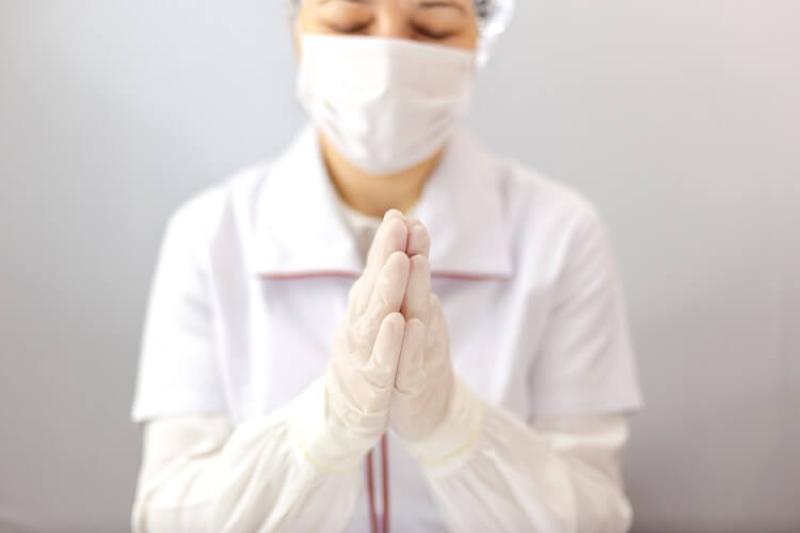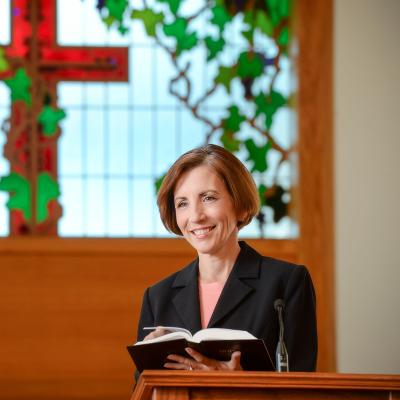- AdventHealth University

A hospital can be a frightening environment for patients as well as a high-stress work environment for hospital staff. Hospital chaplains help alleviate that fear and stress by providing emotional and spiritual care, also known as pastoral care. According to studies, hospital chaplains not only improve the patient experience, they also help prevent burnout and other stress factors in staff.
The role of the hospital chaplain is multi-faceted. Besides providing pastoral care, chaplains can act as a go-between for patients and providers, advocate for the patient to medical staff, explain hospital processes and care to patients, and offer comfort and guidance to people who are experiencing their toughest trials. They are also an invaluable resource to hospital staff who are under a great deal of stress, especially when challenged by extreme conditions such as during the COVID-19 pandemic.
A Master of Science in Spiritual Care may be a good option for individuals interested in helping alleviate fear and stress as a hospital chaplain.
Day-to-Day Duties of a Hospital Chaplain
Like their counterparts in the military, prisons, or hospice care, hospital chaplains regularly counsel people on their worst days, whether that is in a crisis of health, faith, or fear, or some other upheaval. They also help patients navigate hospital rules, procedures, and culture. This specialized knowledge is a feature of all chaplaincies. For instance, hospice chaplains will minister to patients who are terminally ill and may specialize in end-of-life concerns. Military chaplains provide spiritual care to soldiers and have a special understanding of the challenges that they and their families face. Similarly, prison chaplains have institutional knowledge of the effects of incarceration and are uniquely placed to help prisoners with their spiritual care.
A typical day for a hospital chaplain will always include visiting with patients one-on-one, but that is not their only duty. A busy chaplain may be called to meet with patients in the emergency room or help families absorb devastating news or deal with other crisis situations. Chaplains may also meet with patients for celebratory occasions, such as the birth of a child or the discharge of a patient completing treatment. Many hospital chaplains are on the go constantly, responding to the demands of each situation. After meeting with patients, a chaplain writes up notes for the medical staff and may make recommendations to help improve the patient’s mindset and emotional comfort.
Hospital chaplains are also an important part of caring for hospital staff. According to one study published in the Journal of Religion and Health, hospitals that provided pastoral care to their medical providers saw a significant decrease in stress among nursing staff.
The role of hospital chaplain brings its own pressures since chaplains are also caregivers. Many experienced hospital chaplains turn to their peers for emotional and spiritual support and cite self-care practices such as prayer, exercise, and making time to detach and recharge as essential to being effective as a provider.
As with any job, chaplains have administrative tasks to deal with as well — responding to emails, meeting with the spiritual team and with hospital executives and care providers, and writing up reports and presentations.
What Are the Necessary Skills for a Hospital Chaplain?
An experienced hospital chaplain brings a varied tool kit to patient bedsides. Religious beliefs, an understanding of cultural diversity, a spiritual practice, and a solid understanding of human nature are the foundation for a successful career. As demand for chaplains grows, chaplains are learning new skills to meet new challenges in care.
Hospital Chaplain Skills
Here are a few of the traditional competencies a chaplain needs for the role:
- Spiritual guidance. Chaplains provide religious and spiritual comfort for the hospital population, both one-on-one and in group settings.
- Crisis intervention. Whether in the emergency room or elsewhere, chaplains assist when patients and staff are in crisis.
- Patient evaluation and advocacy. Chaplains keep notes on patients and make recommendations to the care staff.
- Educational programs. Chaplains create and manage educational programs and seminars on a variety of topics.
New Hospital Chaplain Skills
As the healthcare industry continues to evolve, the hospital chaplain must adapt. The pandemic especially caused a change in the way chaplains ministered to the hospital population. Here are a few areas where chaplains have had to adapt:
- Remote pastoral care. During the pandemic, chaplains had to learn to provide care via phone or computer.
- Focus on staff burnout. More and more, chaplains minister to hospital staff and provide services to help alleviate stress.
- Social media. Chaplains use Instagram or Facebook to share personal stories or a religious verse or prayer.
Hospital Chaplain Salary and Career Outlook
The U.S. Bureau of Labor Statistics (BLS) includes hospital chaplains in the broad category of clergy, with an annual median salary of $50,400. Of those clergy members, there are some 8,100 employed at hospitals in the U.S., with a mean annual salary of around $55,800. As with other professions, salaries can be impacted by multiple factors, including education and experience, type and size of facility, and location.
The demand for clergy members is expected to rise 4% between 2019 and 2029, according to the BLS, which is similar to the average growth rate projected for all occupations. With church attendance on the decline, according to the Pew Research Center, experts say that chaplains will fill that void.
Changes in the healthcare industry are bringing new challenges, considerations, and opportunities for hospital chaplaincy staff. One of the biggest challenges is how to quantify the value of pastoral care. In some hospitals, chaplains are being asked to show their work — i.e., how do they impact and improve patient care? However, hospital chaplains point out that their work is invaluable precisely because it can’t be measured.
The COVID-19 pandemic has also changed pastoral care. Prior to the pandemic, the standard of care with patients was bedside care with physical touch, in which chaplains provided a calming presence. During the pandemic, hospital chaplains have had to adjust their tactics to overcome the physical barriers between chaplain and patient, such as by using telephone or video calls, to continue their roles as effective spiritual advocates.
Pursue a Career as a Hospital Chaplain
AdventHealth University Online’s Master of Science in Spiritual Care is a degree program that can be completed in less than three years and may be right for students who are seeking a focused degree in chaplaincy for healthcare settings rather than a broader Master of Divinity.
Many people who are called to ministry find that a hospital chaplaincy position is an excellent opportunity to provide spiritual care to people who need it most. See if this program is right for you.
Recommended Readings
How to Become a Chaplain
Religion and Healthcare: The Importance of Cultural Sensitivity
AdventHealth University’s Master of Science in Spiritual Care Gains Important Accreditation Affirmation
Sources:
Boston Globe Magazine, “Chaplains and the Rise of On-Demand Spiritual Support”
Healthcare Chaplaincy Network, People Want Spiritual Care Included in Their Health Care
Journal of Religion and Health, “Knowledge, Attitudes, and Interactions with Chaplains and Nursing Staff Outcomes: A Survey Study”
Religious News Service, “Hospital Chaplains Stick to the Heart of the Job Amid Health Care Industry Changes”
The San Diego Union-Tribune, “Hospital Chaplains Adapt to Coronavirus Challenges”
Spectrum News NY1, “A Day in the Life of a Hospital Chaplain During the Coronavirus Pandemic”
U.S. Bureau of Labor Statistics, Occupational Employment and Wages, May 2019, Clergy
U.S. Department of Veterans Affairs, “VA Pittsburgh Chaplains Continue Care During COVID-19”
U.S. News & World Report, “For Hospital Chaplains, Coronavirus Has Shifted Spiritual Care”


